

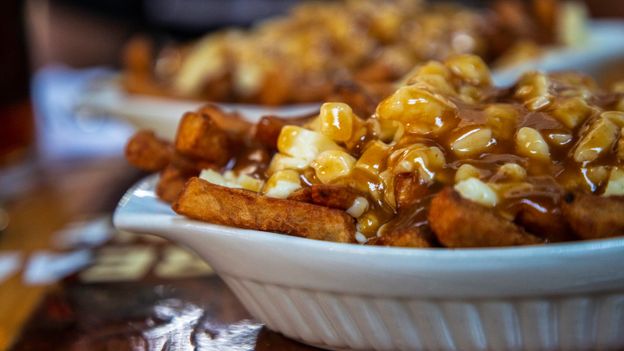
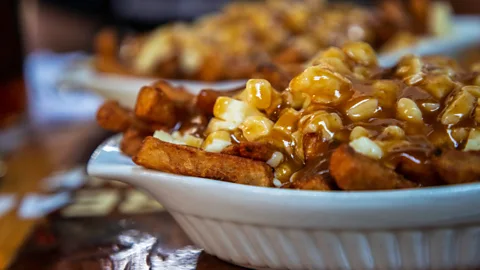 Getty Images
Getty ImagesMontreal-born chef Michele Forgione makes one of the best poutines in the city. Here are his top poutine picks in Montreal, from Chez Ma Tante to Ma Poulle Mouillée.
Piping-hot French fries topped with squeaky cheese curds and brown gravy: in Canada’s Quebec province, poutine is tantamount to passion. The beloved dish has become emblematic of the province and opinions abound on which curds make the best topping or how the frying method affects the dish.
Legends about its origins are also plentiful. In a 2015 tourism campaign, the town of Drummondville, Quebec, claimed ownership of poutine, declaring that it was invented in the 1960s by self-proclaimed “l’inventeur de la poutine” Jean-Paul Roy of local restaurant Le Roy Jucep. Another legend states that a customer mixed cheese curds with French fries at restaurant La P’tite Vache in Princeville, Quebec in 1966. But the most prevailing legend points to the town of Warwick, Quebec, in the late 1950s, when restauranteur Fernand Lachance of Le Café Idéal exclaimed “Ca va faire une maudite poutine!” (“It will make a damn mess!”) when a customer asked him to put cheese curds in a takeaway bag of frites.

In Montreal, Quebec’s largest city, poutine can take many forms. Since the invention of poutineries (poutine-only restaurants) in the 1980s, poutine has become a vehicle for an endless range of toppings, representing the great cultural diversity of the city itself, as many of the city’s ethnic groups offer their own takes on the dish.
To find the city’s most delicious poutine, we spoke to Michele Forgione, restaurateur and owner of modern Montreal casse-croûte (Quebecois snack bar) Chez Tousignant, whose poutine is often touted as one of Montreal’s best. “I truly believe that the culinary heritage that every single ethnicity brings to the city is very important,” he says. “Montreal is a melting pot, and one can really travel through different cultures through its food. That to me is so unique.” But no matter what goes on top of a poutine – from Portuguese chicken to Haitian griot (pork shoulder) – there are three non-negotiable elements: French fries made from red skin potatoes, dark gravy made from chicken or beef stock and fresh cheese curds. “Not mozzarella!” says Forgione.
Here are Forgione’s top poutines in his hometown of Montreal.
 Victoria Vonapartis
Victoria VonapartisFor a proper introduction to Montreal’s poutine scene, Chez Ma Tante – a casse-croûte in Montreal Nord – is it. Their take on the dish is the “quintessential, classic poutine”, says Forgione. What makes it a classic? It’s all in the fries – using red skin potatoes means that the fries “will never get too crunchy. They can’t – they have a higher starch content.” The frying technique is also key: the potatoes must be double fried, first on a lower heat setting – around 138C – and then again, 38C hotter says Forgione. “You’re getting the outside super golden. It’s like a tempura batter. You just want to eat it more; it becomes addictive.”
Chez Ma Tante started life as a mobile restaurant in 1929 (first in a horse-drawn carriage, then in a campervan). In 1950, the establishment built a permanent home on Rue Fleury and has been there ever since, with minimal changes to the decor or exterior. “It’s the classic diner. There’s no seating, really – it’s an in-and-out situation,” says Forgione. He also recommends a steamé, their famous steamed hot dog. “It’s one of those places where you know you can have a steamed hot dog and a poutine and that’s it, that’s all you want.”
 Getty Images
Getty ImagesSituated in Montreal’s colourful Plateau neighbourhood – lined with brightly painted townhouses bedecked with characteristic outdoor staircases – Ma Poule Mouillée is a local favourite and a prime example of fusion cuisine. This counter-service Portuguese restaurant is famous for its flame-licked chicken, which also tops their chorizo-studded poutine that has since become legendary for melding two iconic dishes.
“It’s like a meal,” says Forgione. “[The chicken is] juicy, it’s tender, it’s moist. It just goes together. You’re accustomed to all the flavours, but it’s served in a different way. It’s basically chicken salad! That’s how I see it.”
The restaurant’s signature sauce mingles with the gravy and gives the dish “a little heat”, says Forgione. “It all just goes together.” What exactly is in the sauce is a closely guarded secret – owner Tony Alves, who opened the restaurant in 2013, will only concede that he uses piri piri peppers. Thanks to Montreal’s sizable Portuguese population, there are several restaurants in town specialising in the country’s famously fiery rotisserie bird (including down-the-street Romados), but the chicken-poutine hybrid is a Ma Poulle Mouillée special.
Address: 969 Rachel St E, Montreal, Quebec H2J 2J2
Phone number: +1 514-522-5175
Instagram: @mapoullemouillee
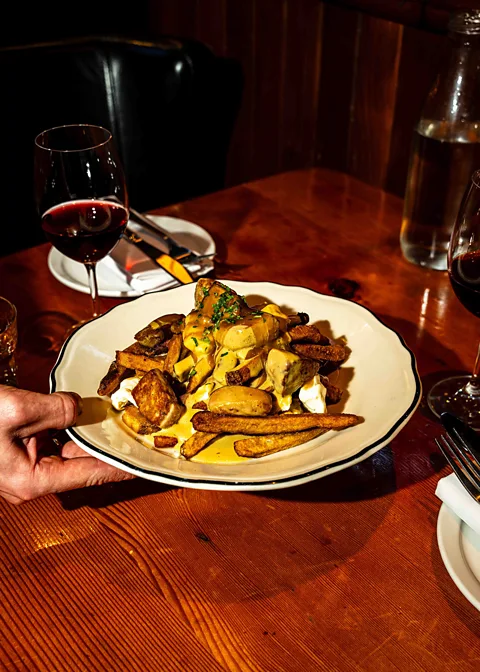 Scott Usheroff
Scott UsheroffAu Pied de Couchon, also in the Plateau neighbourhood, is without a doubt one of Montreal’s most beloved restaurants; the brainchild of legendary Canadian chef Martin Picard. “[He’s] a good friend,” says Forgione. “He’s one of the top chefs in Canada, if not North America.”
Since it opened in 2001, the restaurant has championed Quebecois food. Twenty-five years ago, the province’s cuisine was rarely taken seriously by the city’s chefs, who preferred elaborate French techniques to the homey, lard-soaked dishes of French Canada. Picard created a sea-change in local attitudes by presenting humble, traditional Quebecois ingredients and flavours in new and surprising formats – like their famous Plogue à Champlain, a buckwheat pancake piled with melted cheese, roasted potatoes, bacon, demi-glace and a drizzle of maple syrup.
And no dish is more representative of Picard’s cooking style than Au Pied de Cochon’s foie gras poutine. It’s a cult favourite across the city for its irresistible high-low approach, which pairs a classic poutine with a custardy sauce made from duck or goose liver. Forgione is particularly fond of it. “The French fries are super crispy, very addictive,” he says. “The foie gras sauce is unctuous, decadent. It’s on another level. And the cheese curds are just squick-squick. That taste when they’re fresh, you know what I mean?”
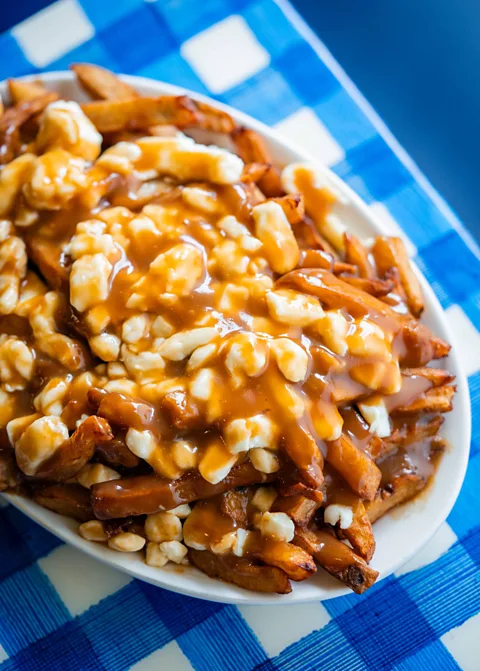 Patricia Brochu
Patricia BrochuAsk any Montrealer where to try poutine and most will suggest La Banquise. This local institution has been around since 1968 and serves an expansive menu of creatively topped poutines, as well as burgers, hot dogs and brunch. It’s also open 24 hours a day, making it the preferred post-party stop after a night at the city’s famous clubs and bars.
Forgione remembers several of his own poutine-fuelled nights here. “You’re a kid, you’re in your teens, 20s… after going out with your friends until 03:00, 04:00 in the morning, you’ll [have] burn[ed] the calories.”
His favourite is La Galvaude, a version of the classic poutine topped with grilled chicken and green peas, or “anything with hot dogs on top”. There are also vegetarian and vegan poutines on the menu; a relative rarity.
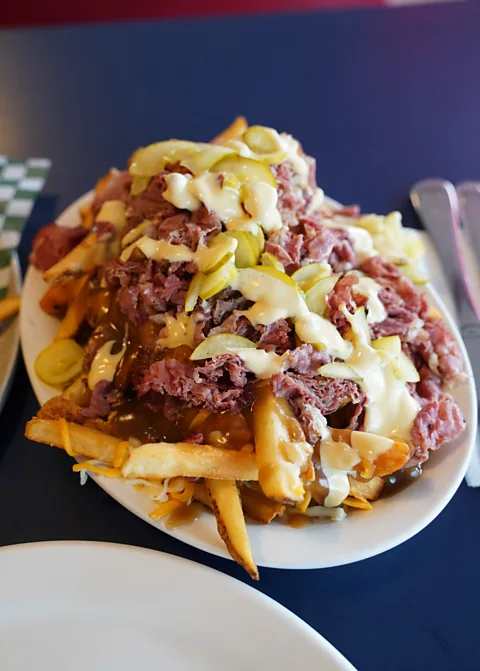 Getty Images
Getty ImagesThere’s another dish no visitor should leave Montreal without trying: smoked meat. The city’s signature deli meat is a cousin to New York’s pastrami, and it’s served atop poutine at Jarry Smoked Meat, a deli in the north-eastern Saint-Leonard neighbourhood. Forgione grew up nearby – where “all the Italians” live, he quips – and remembers many evenings spent in the classic diner, eating poutine topped with strips of brisket that’s been dry rubbed rather than brined, giving it a stringier, softer texture than New York’s fattier navel cut.
Insider tip
Poutine may be Quebec’s star dish, but Forgione urges visitors not to miss these other classic dishes from the province: frites sauce (“Basically fries and poutine sauce (gravy),” he says); fries with a splash of vinegar and cayenne pepper (“for heat”); and a moutarde chou hot dog topped with yellow mustard and coleslaw.
Both brisket and smoked meat come from Eastern European Jewish immigrants, who applied traditional techniques for preserving meat to North American beef. “It was a method of feeding the masses,” says Forgione. “It was cheap cuts of meat. Don’t look at brisket today, whose costs have gone through the roof. It was a cut of meat nobody want[ed] because what do you do with a tough, tough piece of meat? You had to know what you were doing, and they brought so much knowledge.”
Smoked meat is most often served between two slices of rye bread, and Jarry does serve a smoke meat sandwich as well. But their smoked meat poutine is the ultimate indulgence, says Forgione. “It’s beefy, it’s salty, it’s sweet a little, it’s smoky,” he enthuses. “It’s the ultra-decadent food. Merging these two iconic dishes from Montreal [is] euphoric. It’s like Metallica playing Mozart at [Montreal performance venue] Place-des-Arts.”
BBC Travel‘s The SpeciaList is a series of guides to popular and emerging destinations around the world, as seen through the eyes of local experts and tastemakers.